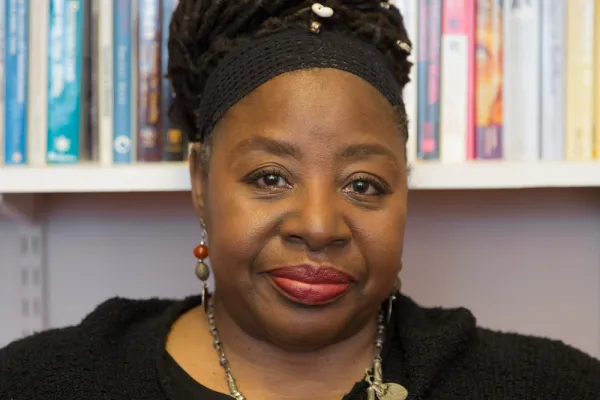Prof. Loretta Ross: Powerful Testimony
Research & Inquiry

Published October 1, 2021
In testimony before the House Committee on Oversight and Reform on Thursday, Sept. 30, Professor Loretta Ross joined other prominent women in sharing stories of their experience around abortion and in urging continued access to health care and reproductive rights.
“I don’t have written testimony because I feel the need to speak from my heart,” Ross told the committee, before sharing that at age 14 she’d had a child as result of rape and incest, and at age 16 she had an abortion.
“It was so hard to raise that child born of rape and incest,” she said. “I really don’t think it should be more difficult 53 years later for a child in Texas than it was for me in 1968.”
An associate professor of the study of women and gender at Smith, Ross was one of 10 women invited to testify before the Oversight Committee about S.B.8, the new Texas law that bans almost all abortions, and about similar legislation pending in other states.
Ross spoke of her personal experience—and she also spoke as a scholar. As one of the people who collaborated to create the theory of reproductive justice in 1994, Ross has written and taught extensively about how unequal access to health care has a disproportionately negative effect on poor people, women of color and people from other underrepresented groups. “We want to have the right to have the children we want to have,” she said, “and we want to have the right to not have the children we don’t want to have. Most importantly, we want to have the right to raise those children in a safe and healthy environment.”
Ross’ testimony came early in the day; she was on a panel of leading experts from the fields of health care and academia. Earlier in the morning, five Congresswomen shared their personal stories around abortion.
On the same panel as Ross was feminist leader Gloria Steinem ’56. “I bet I’m one of the only people [on this panel] old enough to remember how bad it was when abortion was illegal,” said Steinem. “That’s why what’s happening in Texas is not only a local issue or a women’s issue—it’s a step against democracy, which allows us control over our own bodies.”
In spirited questioning from committee members that lasted most of the afternoon, Ross shared her frustration around a political system that she says marginalizes and disempowers people of color. “I’m tired of white saviors saying that black folx aren’t smart enough to make decisions about our own lives,” she said. “Black women are smart enough to control our own bodies.”
Due to the timing of her testimony, Ross was unable to be in her White Supremacy class Thursday afternoon, but she urged students to tune in to the event via a House livestream. Nicolette McGrath, a Frances Perkins scholar from Mount Holyoke College enrolled in Ross’ course, said she “absolutely” watched the entire hearing, crying at the powerful testimony of the women who shared their abortion stories and “raging at the television” because of the “misinformation” presented by some of the politicians, “especially the blatant patriarchal views, and the idea that race isn’t a social construct.”
McGrath says that, for her, the hearing’s greatest impact came from the witnesses’ personal stories. “Miss Loretta has been sharing her story for 50 years,” McGrath said, “and she’s still doing it. I hope that people like her telling their stories today helps other people feel safe sharing their stories. And that will get things moving, so that we can stop fighting this fight around an issue that shouldn’t even be a question anymore.”